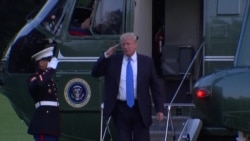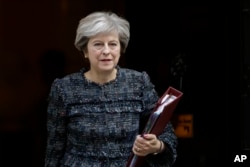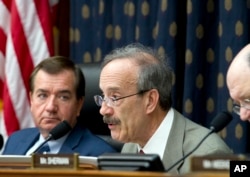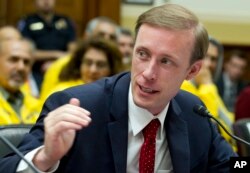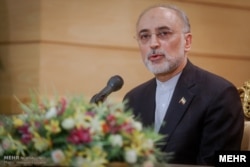President Donald Trump is expected to announce this week that he will no longer certify Iran's compliance with the 2015 Iran nuclear agreement, giving Congress 60 days to decide whether to re-impose U.S. sanctions on Tehran.
"The president has reached a decision on an overall Iran strategy and wants to make sure we have a broad policy to deal with that, not just one part of it, to deal with all of the problems of Iran being a bad actor," White House Press Secretary Sarah Huckabee Sanders said Tuesday.
News that the president might not certify the deal prompted an outpouring of concern, both at home and abroad. British Prime Minister Theresa May phoned Trump on Tuesday to urge him to reconsider, calling the agreement "vital for regional security." British Foreign Secretary Boris Johnson called his counterpart Secretary of State Rex Tillerson to argue that the deal was "making the world a safer place."
At a meeting Wednesday of the House Foreign Affairs Committee, ranking Democrat, Representative Eliot Engel of New York, said he had originally opposed the accord, known as the Joint Comprehensive Plan of Action (JCPOA), when it was agreed to by the Obama administration. But he said he is now opposed to backing away from it.
"As the administration seems poised to take the first step from the JCPOA, I must say I view that course as a grave mistake," Engel said. "Unless we see solid evidence that Iran is cheating, the United States has to live up to our word."
Later, when questioned by committee member Dana Rohrabacher, a Republican from California, about whether they thought Iran is complying with the agreement, three of four witnesses testifying at Wednesday's hearing replied in the negative.
In his opening statement, Committee Chairman Ed Royce, a California Republican, said whatever the president decides, "the United States must work with allies to improve the agreement, including ensuring that international inspectors have better access to possible Iranian nuclear sites.
"I believe that President Obama's flawed nuclear deal was a gamble. A gamble that Iran would choose to become a responsible actor: a country focused on prosperity for its people and security along its borders," Royce told the committee. "Unfortunately, and predictably, the Tehran regime clearly still sees itself as a movement, one that uses ideology and violence to destabilize its neighbors, to threaten others, mainly the United States and Israel."
WATCH: Congress Bracing for Trump's Decision on the Iran Nuclear Deal
Two Iran experts from the New York-based Council on Foreign Relations (CFR) on Wednesday warned that any move by Congress to pull away from the accord is fraught with numerous traps.
"They have to figure out how to navigate those traps," said Ray Takeyh, a senior CFR fellow for Middle East studies, during a conference call with reporters. "If they fail to follow up on decertification with a punitive strategy and punitive measures, that [would] really significantly erode the credibility of the United States and diminishes its leverage."
Philip Gordon, senior CFR fellow on U.S. foreign relations, said any missteps by Congress could negate all the progress made in containing Iran's nuclear ambitions.
"If Congress acts in a way inconsistent with the JCPOA to blow it up, then we isolate the United States, raise questions about our reliability, give Iran a pretext to resume [a] nuclear program, fail to get other countries on board for new sanctions, and then find ourselves essentially where we were in 2012 again, without a good answer to deal with Iran's nuclear program," Gordon said.
In his testimony before the foreign affairs committee Wednesday, Jake Sullivan, a national security adviser to former vice president Joe Biden, expressed essentially the same concern about what a withdrawal from the Iran deal might mean in terms of U.S. credibility in other international negotiations.
"Both with respect to China and with respect to any effort to negotiate with North Korea, going to them and saying, 'Hey, work a deal with us on the nuclear issue, you can count on us to actually enforce it,' that would be a laughable proposition if we've just walked away from the Iranian nuclear deal," Sullivan said.
The accord, signed by Iran and the five permanent members of the United Nations Security Council plus Germany, requires Tehran to sharply restrict its nuclear program and allow more access to international inspectors. Iranian leaders also promised not to seek, develop or acquire nuclear weapons.
In return, Iran received relief from crippling economic sanctions, including the release of billions of dollars in frozen overseas assets and re-admittance to the international banking system.
A decision not to recertify would not void the deal and does not automatically bring previous sanctions back into force. Instead, it would send the issue to Congress for debate. Supporters of the agreement have expressed concern, however, that not continuing the accord could set in motion a process that would snap sanctions back into place and result in undoing the accord.
Those who advocate pulling back from the deal say it could be a first step toward strengthening its provisions and putting tougher controls on Iran.
The head of Iran's nuclear agency, Ali Salehi, on Tuesday warned Washington against undermining the deal, saying international nonproliferation efforts, as well as Washington's global standing, would suffer.
Trump previewed his decision last month in a speech to the United Nations General Assembly, saying "The Iran deal was one of the worst and most one-sided transactions the United States has ever entered into."
Joshua Rovner, an associate professor at the School of International Service at American University, said any unraveling of the Iran deal would have a number of lesser-understood negative consequences for the United States.
"There is a danger of losing a lot of very valuable intelligence on Iran's activities." Rovner told VOA.
"The thing that I particularly liked about the deal was that by enabling the IAEA [International Atomic Energy Agency] to be much more intrusive in monitoring Iran, the intelligence community had an opportunity to maybe look at other things. And start to map networks of people who are moving fissile material or materials used for a nuclear program," Rovner added.
The Iran Project, a group led by several former U.S. diplomats backing the accord, issued a statement saying a decision not to recertify "would have grave long-term political and security consequences for the U.S. — including another regional war."
The statement argued that "No American national security objective would be served by scuttling the nuclear agreement as long as Iran remains in compliance and without a nuclear weapon."




